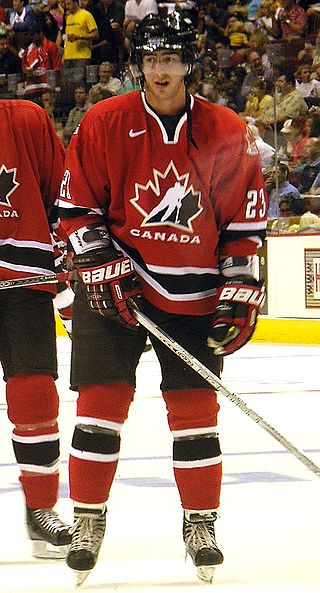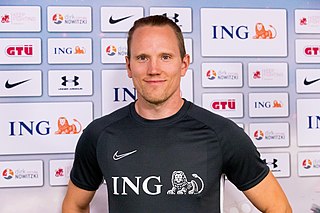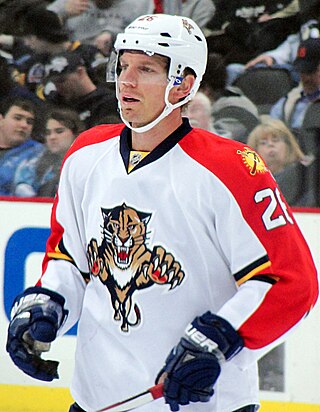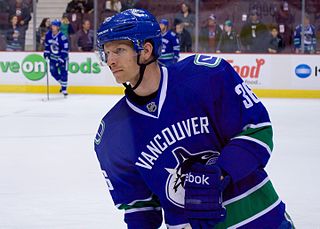
Hockey at the 2002 Winter Olympics was held at the E Center in West Valley City and Peaks Ice Arena in Provo, Utah. The men's and women's tournaments were won by Canada, who defeated the host United States in both finals.

Ice hockey tournaments have been staged at the Olympic Games since 1920. The men's tournament was introduced at the 1920 Summer Olympics and was transferred permanently to the Winter Olympic Games program in 1924, in France. The women's tournament was first held at the 1998 Winter Olympics.

The Triple Gold Club is the group of ice hockey players and coaches who have won an Olympic Games gold medal, a World Championship gold medal, and the Stanley Cup, the championship trophy of the National Hockey League (NHL). The International Ice Hockey Federation (IIHF) considers them to be "the three most important championships available to the sport".

Luc Bourdon was a Canadian professional ice hockey defenceman who played for the Vancouver Canucks of the National Hockey League from 2006 until 2008. After overcoming childhood arthritis, he was selected third overall in the 2003 Quebec Major Junior Hockey League (QMJHL) draft and played for the Val-d'Or Foreurs, Moncton Wildcats, and Cape Breton Screaming Eagles, spending four seasons in the QMJHL. The Canucks drafted Bourdon with their first selection, 10th overall, in the 2005 NHL Entry Draft, and he split his professional career with the Canucks and their American Hockey League affiliate, the Manitoba Moose. Noted as a strong defenceman who could contribute on offence, Bourdon represented Canada in three international tournaments, winning two gold medals at the IIHF World Junior Championship and a silver medal at the IIHF World U18 Championship.

Daniel Hamhuis is a Canadian former professional ice hockey defenceman who played in the National Hockey League (NHL). He was drafted in 2001 by the Nashville Predators.

Christian Ehrhoff is a German professional ice hockey defenceman for Krefeld Pinguine of the German DEL2. In 2018, he won silver at the Winter Olympics. He played more than 800 games in the National Hockey League (NHL) and more than 300 in the Deutsche Eishockey Liga (DEL) in Germany. He is known primarily as an offensive defenceman with strong skating and shooting abilities.

Karl Mikael Samuelsson is a Swedish former professional ice hockey right winger and current player development coach for the Vancouver Canucks. Samuelsson began his career in Sweden, starting with small town team IFK Mariefred, followed by Södertälje SK as a junior in 1994. He went on to also play for Swedish teams IK Nyköping, Frölunda HC and Brynäs IF. After being selected 145th overall in the 1998 NHL Entry Draft by the San Jose Sharks, he moved to North America for the 2000–01 NHL season. Samuelsson spent short stints with the Sharks, New York Rangers, Pittsburgh Penguins and Florida Panthers, before returning to Europe during the 2004–05 NHL lockout. As NHL play resumed, Samuelsson signed with the Detroit Red Wings, where he enjoyed individual and team success, winning the Stanley Cup with the club in 2008. After four seasons in Detroit, he signed with the Vancouver Canucks in July 2009. He enjoyed the two most successful individual seasons of his career with Vancouver, recording back-to-back 50-point campaigns in 2009–10 and 2010–11. In his third year with the club, he was traded to the Panthers for his second stint in Florida. At the end of the season, he re-signed with the Red Wings in July 2012.

Keith Galen Ballard is an American former professional ice hockey defenseman who previously played in the National Hockey League with the Phoenix Coyotes, Florida Panthers, Vancouver Canucks and Minnesota Wild. He played college hockey for the Minnesota Golden Gophers of the Western Collegiate Hockey Association (WCHA) for three seasons. After his freshman year, he was selected 11th overall by the Buffalo Sabres in the 2002 NHL Entry Draft. Before he made his NHL debut, he was traded twice – initially to the Colorado Avalanche, then to the Phoenix Coyotes. He played his professional rookie season in 2004–05 with the Coyotes' American Hockey League (AHL) affiliate, the Utah Grizzlies, then debuted with Phoenix the following season. After three years, he was traded to the Florida Panthers, where he spent two seasons before being dealt to Vancouver at the 2010 NHL Entry Draft.

Jannik Hansen is a Danish former professional ice hockey right winger. Hansen began playing professionally at the age of 16 with both the Rødovre Mighty Bulls of the Danish league and the Malmö Redhawks of the Swedish J20 SuperElit and HockeyAllsvenskan leagues. He played three seasons with Rødovre, during which time he was selected 287th overall by the Canucks in the 2004 NHL Entry Draft. A year after his selection, he moved to North America to play major junior hockey with the Portland Winterhawks of the Western Hockey League (WHL) for one season. In 2006–07, Hansen began playing with the Canucks' minor league affiliate, the Manitoba Moose of the American Hockey League (AHL). That season, he was called up by the Vancouver Canucks and became the first Danish citizen to play and register a point in an NHL playoff game. After another campaign spent primarily with Manitoba, Hansen earned a full-time roster spot with the Canucks.

Ulf Niklas Alexander Edler is a Swedish professional ice hockey defenceman who is an unrestricted free agent. He previously played for the Vancouver Canucks and the Los Angeles Kings of the National Hockey League (NHL). He was drafted out of Sweden's third-tier ice hockey league by the Canucks in the third round, 91st overall, in the 2004 NHL Entry Draft, and played junior ice hockey with Modo Hockey of the J20 SuperElit and the Kelowna Rockets of the Western Hockey League (WHL).

Cody Douglas Hodgson is a Canadian professional ice hockey centreman who is currently on a professional tryout with the Milwaukee Admirals of the American Hockey League.

The men's tournament in ice hockey at the 2010 Winter Olympics was held in Vancouver, British Columbia, Canada, from February 16–28, 2010. Games were hosted at two venues – Canada Hockey Place and UBC Thunderbird Arena. These Olympics were the first to take place in a city with a National Hockey League team since the NHL players were introduced in 1998, which meant players on the Vancouver Canucks who were competing in the Olympics were playing in their home arena: Roberto Luongo for Canada, Ryan Kesler for the United States, Pavol Demitra for Slovakia, Sami Salo for Finland, Christian Ehrhoff for Germany, and Daniel and Henrik Sedin for Sweden.
The 2009–10 women's national hockey team represented Canada at the 2010 Winter Olympic Games. Prior to the games, the national team participated in several tournaments during the 2009–10 season. The team won the gold medal at the 2010 Winter Olympics in Vancouver. The head coach was Melody Davidson, and she was assisted by Peter Smith and former Vancouver Canucks player Doug Lidster.
The Canada men's national ice hockey team will participate in various events during the 2009–10 ice hockey season.

Sven Butenschön is a German-Canadian ice hockey coach and a former professional ice hockey defenceman who is currently serving as head coach at the University of British Columbia.

The men's tournament in ice hockey at the 2014 Winter Olympics was held in Sochi, Russia between 12–23 February 2014. For the fifth consecutive Olympics, players from the National Hockey League participated. Twelve countries qualified for the tournament; nine of them did so automatically by virtue of their ranking by the International Ice Hockey Federation, while the other three took part in a qualification tournament.

The ice hockey (hockey) competitions of the 2018 Winter Olympics were played at two venues within the Gangneung Coastal Cluster in Gangneung, South Korea. The Gangneung Hockey Centre, which seats 10,000, and the Kwandong Hockey Centre, which seats 6,000, were both originally scheduled to be completed in 2016 but appear to have been completed in early 2017. Both venues contain Olympic-sized rinks.
The men's tournament in ice hockey at the 2018 Winter Olympics was held in Gangneung, South Korea between 14 and 25 February 2018. Twelve countries qualified for the tournament; eight of them did so automatically by virtue of their ranking by the International Ice Hockey Federation, one, South Korea, automatically qualified as hosts, while the three others took part in a qualification tournament.
The ice hockey competitions of the 2022 Winter Olympics was played at two venues located in Beijing. The Beijing National Indoor Stadium, which seats 18,000, is located at Olympic Green area. The Wukesong Arena, seating 10,000, was also used, with both arenas having been constructed for the 2008 Summer Olympics.

The men's tournament in ice hockey at the 2022 Winter Olympics took place in Beijing, China between 9 and 20 February 2022. Twelve countries qualified for the tournament; eight of them did so automatically by virtue of their ranking by the International Ice Hockey Federation, one, China, automatically qualified as hosts, while the three others took part in a qualification tournament.

















